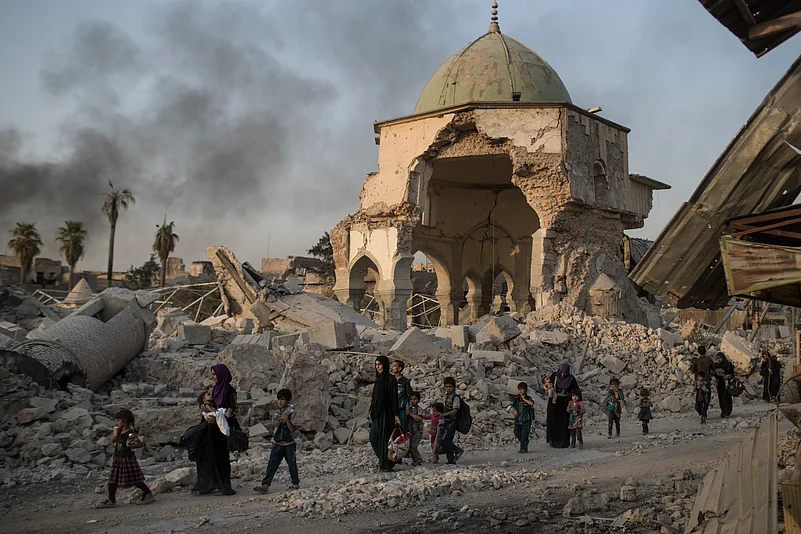The United Nations cultural agency has discovered five bombs hidden within the walls of the historic al-Nouri Mosque in northern Iraq's Mosul, which is a remnant of the rule of Islamic State militant group over the area.
Iraq: Years After IS' Defeat, UNESCO Finds 5 Bombs Hidden In Al-Nouri Mosque's Walls In Mosul
It said one of the bombs had been defused and removed, while the remaining four are interconnected and will be disposed of in the coming day safely.

Famous for its 12the century leaning minaret, the mosque was destroyed by IS in 2017 and since 2020, has been a key focus for UNESCO's restoration efforts since.
The UN agency said that it found five large-scale explosive devices, designed for severe destruction, inside the southern wall of the Prayer Hall on Tuesday.
“These explosive devices were concealed within a specially rebuilt section of the wall,” a statement, adding that "Iraqi authorities were promptly notified, secured the area, and the situation is now fully under control."
Reportedly it said that one of the bombs had been defused and removed, while the remaining four are interconnected and will be disposed of in the coming day safely.
Iraqi authorities requested UNESCO to pause all its restoration works at the al-Nouri Mosque, asking them to entirely evacuate the premises until all the explosives are disarmed.
A decade ago, on June 29, 2014, IS leader Abu Bakr al-Baghdadi had declared an Islamic caliphate from the mosque, leading to its destruction when extremists bombed it during the battle for Mosul's liberation in 2017.
These newly discovered bombs are a proof of the challenges that authorities face in clearing Mosul of any explosives and revive the destroyed urban areas of the city.
United Nations' added support to International efforts have been focusing on clearing the mine and helping the city's revival. However, despite efforts, majority of Mosul's old city remains in ruins.
UNESCO's statement said that the agency aims to complete the full restruction of al-Nouri Mosque by December, "finally erasing the stigma of the Daesh occupation," the Arabic acronym for the IS' name.
A decade after IS declared its caliphate in large parts of Iraq and Syria, the extremists no longer control any land and has lost many of its key leaders.
However, the group continues to recruit members and claim responsibility for devastating attacks across the world, including the lethal operations in Iran and Russia earlier this year.
Reportedly, IS militant group's sleeper cells also carry out attacks against government forces in both Syria and Iraq as well as US-backed Syrian fighters, at a time when Iraq's government is negotiating with Washington over a possible withdrawal of US troops.
(With AP inputs)
- Previous Story
 Marburg Virus Outbreak In Rwanda Leaves 11 Dead | All About The Deadly Ebola-Like Virus
Marburg Virus Outbreak In Rwanda Leaves 11 Dead | All About The Deadly Ebola-Like Virus - Next Story
























